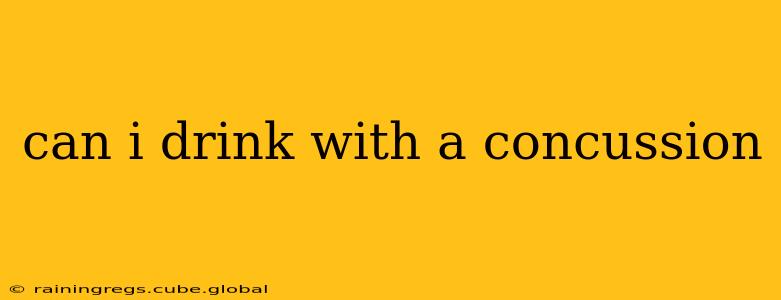A concussion is a traumatic brain injury (TBI) that can result from a blow to the head or body, causing the brain to bounce around or twist inside the skull. This jarring can disrupt brain function, leading to a range of symptoms. Crucially, alcohol consumption after a concussion is strongly discouraged and can significantly worsen the recovery process.
While the immediate urge might be to self-medicate, alcohol is a depressant that interacts negatively with the already compromised brain. This section will explore the reasons why combining alcohol and concussion recovery is dangerous and detrimental.
Why You Shouldn't Drink Alcohol After a Concussion
Alcohol interferes with the brain's natural healing process in several ways:
-
Increased Inflammation: Alcohol can increase inflammation in the brain, potentially prolonging recovery time and exacerbating symptoms. The brain is already inflamed after a concussion, and adding alcohol only makes this worse.
-
Impaired Healing: The body requires adequate time and resources to repair brain tissue after a concussion. Alcohol diverts resources away from this vital process, hindering recovery.
-
Exacerbated Symptoms: Alcohol can worsen common concussion symptoms like headaches, dizziness, nausea, and cognitive difficulties (memory problems, difficulty concentrating). This makes everyday tasks more challenging and prolongs the recovery period.
-
Masked Symptoms: Alcohol can mask the severity of your concussion symptoms, making it harder to accurately assess your recovery progress and potentially delaying necessary medical attention.
-
Increased Risk of Complications: In some cases, alcohol consumption after a concussion can lead to more serious complications, including prolonged post-concussion syndrome (PCS). PCS can significantly impact your quality of life, lasting for months or even years.
What to Do Instead of Drinking After a Concussion
Focusing on rest and recovery is paramount after a concussion. Here are some healthy alternatives to drinking alcohol:
-
Hydration: Drink plenty of water to stay hydrated, which is essential for brain function and healing.
-
Nutritious Diet: Eat a balanced diet rich in fruits, vegetables, and whole grains to support brain health.
-
Rest: Get plenty of sleep to allow your brain to heal. Avoid strenuous activity and screen time.
-
Medical Attention: Follow your doctor's advice and attend all follow-up appointments. They can monitor your progress and ensure you're recovering properly.
-
Cognitive Rest: Avoid mentally taxing activities that could strain your brain. This includes work, school, or intense video games.
How Long Should I Avoid Alcohol After a Concussion?
There's no definitive timeframe for avoiding alcohol after a concussion. It's best to completely abstain from alcohol until you've received medical clearance from your doctor. Your doctor will assess your recovery progress and advise you when it's safe to resume alcohol consumption, if ever. This usually involves a complete resolution of your symptoms and a thorough neurological examination.
What Are the Long-Term Effects of Drinking With a Concussion?
The long-term effects of drinking alcohol after a concussion can be significant. These can include:
-
Prolonged Post-Concussion Syndrome (PCS): PCS can lead to persistent headaches, dizziness, fatigue, cognitive impairments, and emotional disturbances for months or even years.
-
Increased Risk of Future Concussions: Brain damage from a concussion can leave you more vulnerable to further injuries. Alcohol consumption further increases this risk.
-
Neurodegenerative Diseases: Some research suggests a possible link between alcohol abuse and an increased risk of neurodegenerative diseases, such as Alzheimer's disease. This risk might be magnified following a concussion.
Can I drink coffee or energy drinks with a concussion?
While coffee and energy drinks are not alcohol, they contain stimulants that can exacerbate existing concussion symptoms such as anxiety, insomnia, and increased heart rate. It's best to consult your doctor before consuming them. They might recommend avoiding caffeine until your symptoms improve.
Is it safe to take pain relievers with a concussion?
Pain relievers such as acetaminophen (Tylenol) are generally safe to take for concussion-related headaches, but it's always best to check with your doctor before starting any new medication. They can provide appropriate pain relief recommendations considering your specific situation and other medications you are taking. Never self-medicate.
In conclusion, avoiding alcohol after a concussion is crucial for optimal recovery. Prioritize rest, proper nutrition, and medical guidance to ensure a safe and effective healing process. Always consult your doctor before making any decisions regarding alcohol or medication use following a concussion. Your health and long-term well-being are paramount.
